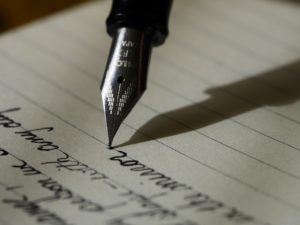 In some ways, being a poet is useful. The likelihood of my relatives reading my work is very slim. Also, the nature of poetry often allows me the ability to write about something without having it look as if I’m writing about it–skewing the narrative. But those two comforts only address fears about reception, personal reception.
In some ways, being a poet is useful. The likelihood of my relatives reading my work is very slim. Also, the nature of poetry often allows me the ability to write about something without having it look as if I’m writing about it–skewing the narrative. But those two comforts only address fears about reception, personal reception.
There is still professional reception to fear and fears about ability. They may be true fears, but they also equal reasons not to write, so that’s how I treat them–the barrier I refuse to admit exists.
Am I good enough? For who? I must believe in myself. What I write is often more than I expect—I surprise myself. So my fears of ability can be a) ignored/squashed/quelled or b) worked on by curing.
I spent a lot of years going to classes and workshops and getting degrees and reading and reading and reading and writing and writing and writing and sharing in writers groups. That’s what I call working on the cure which also sometimes involves eventually distrusting what comes easily— words, approaches, flat-footed emotions, inanimate lines.
I remember earlier times when I thought I was not ready to write about something which meant I was unsure of my ability to present it. Very early on in my writing career, I remember trying to write a poem about a visit to a Put-in-Bay winery. I wanted to somehow have the idea of the wine and the idea of the fountain in the poem, but I couldn’t do it–lack of ability. I worked and worked and worked until the bottle of wine and the glasses themselves became the fountain.
A few years later, before, I think, I’d even taken a writing class, I went to my first writing conference. It was wonderful. As part of the experience, I’d prepared poems for an individual conference. When I met with the poet who would comment and advise, he remarked on my lackluster titles, praised the originality of a single metaphor, and talked about people who wrote only for themselves, how that could be fulfilling.
My contrarian nature rose to the fore and saved me. By voicing my own fears, he pushed me past them although I’m pretty sure that was not what he meant to do.
Just now, coming off of a long dry spell, I encounter the greatest fear—can I still do it? is there anything left? I remember that negative adviser and imagine the long face he would pull. My contrarian edge digs in. I turn to the back of my notebook for the bits and spangles I’ve recorded even though I’d had no time/headspace to write.
— laid out like Gulliver
— origins of bludgeon?
— rain forest, rubber glove
I sign up for a winter break poem-a-day because it’s important to be kind to ourselves. It’s important to keep writing even if we don’t know why.
Ambition moves in me like a fish.
- Guest Post, Susan Grimm: Writing Fears - February 15, 2018